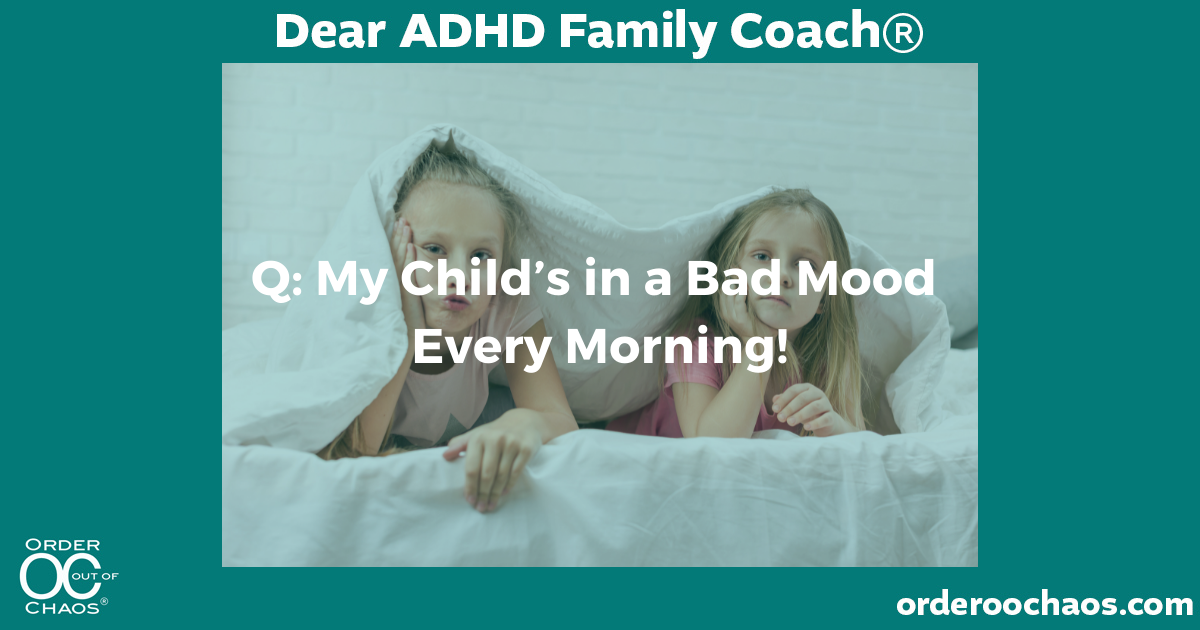Q: My Child’s in a Bad Mood Every Morning!
Your child’s bad mood ruins every morning with griping, arguing, and yelling. Should you ignore the behavior? Or discipline it? An ADHD expert weighs in.
This Dear ADHD Family Coach® column was originally written for ADDitude Magazine.
Q: “My daughter is very moody. It seems like she wakes up, you say something to her, and she yells at you. I am calm and just ignore this behavior right now, but I don’t know what approach I should take to manage this so that, by the time she is a teenager, her behavior doesn’t spiral out of control.” — WebinarMom
Hi WebinarMom:
Many children with ADHD are extremely irritable right after they wake up. They might be rude, cranky, or just plain angry. Pair that with their inability to get moving in the morning and you’ve got a super-stressful start to the day.
Think about it: Your daughter might be struggling to focus and remember what she needs to do to start her day. She may be overwhelmed by the decisions she needs to be make. Or she might have difficulty transitioning from one task to the other while the clock ticks down. This is a lot for a child with ADHD to handle, which may explain her moody morning behavior.
Just to be clear, I’m not saying that speaking to her in the morning is wrong. What I’m saying is that her brain is overloaded. You don’t say how old she is or if she is exhibiting the same behavior at night. Therefore, my advice to you is stay calm, ignore the outbursts, and focus on the goal of moving her through her morning with minimal back-and-forth interaction.
Like what you are reading? WANT MORE? Here are a few articles related to this topic:
Here are a few ideas.
1. Do as much as possible the evening before.
This tip is less about saving time in the morning (even though it does) and more about your daughter making decisions in the evening when the pressure is off, her brain is calm, and she’s fully alert.
Before bed, lay out clothes and toiletries for the next morning. While making lunches and snacks for the next day, prepare breakfast, too. Transition her to evening showers. Gather homework and school supplies, pack backpacks, and place everything by the front door or even in the car. (One of my parent coaching clients does this and it works wonders.) In other words, leave very little to talk about during the morning madness.
2. Manage your expectations… and your daughter’s.
When all is calm, problem solve together. Make it clear what behavior you expect from your daughter in the morning and make sure she gets the opportunity to do the same. If the main goal is to get her out the door with limited prompting or communicating, then perhaps limiting the expectations might make for smoother mornings. What does that look like? As long as she is dressed and teeth brushed by a certain time with NO prompting from you, then we call that a success.
3. Provide visual cues.
Let visual prompts (not you) “talk” to your daughter in the morning. Setting up a wash station at the kitchen sink can act as a reminder that she needs to brush her teeth and wash her face. A colorful, cute note or drawing posted on the bathroom mirror can gently remind her what needs to happen next. Or try this out-of-the box idea: Take photos of her moving through her morning routine. These should be “action shots” of her brushing her teeth, eating breakfast, even finishing responsibilities such as making her bed or feeding the dog. You get the picture! Post the photos wherever the activity takes place. Research shows that we have an easier time processing images, which might appeal to her brain in the morning.
Though I’m hopeful all of these ideas will work to minimize her moodiness, my advice to you is to keep doing what you’re doing. Stay calm, ignore the outbursts, and focus on the goal of moving her through her morning with minimal squabbling. You are on your way.
Good Luck!
OUR MISSION
Order Out of Chaos’ mission is to provide hands-on education, guidance, and coaching to parents and their students through our customized products and programs, so all children – both mainstream and with learning difficulties – can develop the necessary skills needed to experience success in learning and in life.




